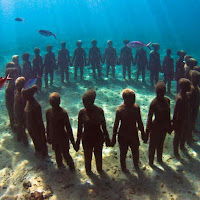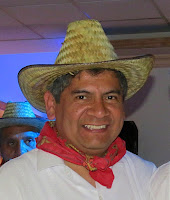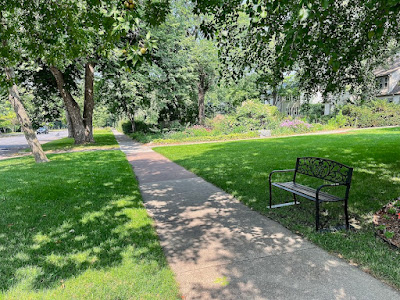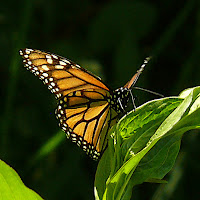This luxuriant, unfurling season between Mothers Day and Fathers Day seems
a perfect time to reflect on the honorees of both.
~ •. ~ •. ~
The more time that's passed since my parents died, the better I understand them. The more I appreciate the many gifts they’ve bestowed on me. Their respective influences, though often seeming polar opposites, have actually turned out to complement each other. And that, I believe, is a good thing.
My father, like most men of his generation—or, for that matter, any generation—was a problem solver. He relished a challenge, whether that meant fixing a leaking this or a squeaky that, reglazing a window or mastering some mental exercise. He’d apply every milligram of his engineer alter ego to analyzing the problem, planning a solution, and then methodically executing it. (He desperately wanted the process to be a point of connection with me and my brother—an invitation we too often spurned.)

I’m sure Dad was just emulating the role models who’d guided him in his growing up—his father, his friends, perhaps a couple of teachers, a boss or a Scoutmaster. These were competencies reinforced by cultural norms; cleverness, resourceful-
ness, focus, all were essential both to his successful career as a restaurateur and to his role as a homeowner.
Mom’s response was not to fix it.
It was to outlast it.
LET IT BE
To Dad’s yang, my mother was definitely the yin.
When Mom would face a challenge, her response was not to fix it; it was to outlast it. She never said it in so many words, but she evidently embraced that old saw, This too shall pass. You have a lump or a pain somewhere, you keep an eye on it and chances are it will eventually disappear all by itself.
It’s possible that, having grown up as the only girl among four brothers, that stoicism was a coping mechanism, perhaps one way to distinguish herself. And, just as Dad’s fix-it disposition proved an asset in his career, Mom’s let-it-percolate makeup must have equipped her well for her career as an artist. (She was a commercial fashion illustrator.)

PUTTING ON HEIRS
Both Mom and Dad radiated definite, and quite different, vibes. He, while often serious and businesslike at home, also had a much lighter side. Once in a long while, I’d overhear him laughing and joking with friends. I’ll never forget the good-natured bonhomie he showed at work, an air of competence and warmth that surrounded him as he walked around his cafeteria chatting with customers.

Mom’s temperament was more homogeneous; she was a total introvert. Quiet, shy, slow to speak, reluctant to act, but much of her reticence was simply shyness. I’m sure some people thought she was a snob. More chari- table folks described it as a sort of regal aura.
The older we both got, the more I felt there was a philosophical or spiritual angle to my mother’s demure disposition. I started seeing it as kind of Zen-like.
Sometimes it suited one better to simply relax
and let things happen.
OMEGA MALE?
I inherited parts of both of these distinct MOs. Like my mother I was the gardener, the artist. I too was quite reserved and a bit of an introvert.
But I also had to be a businessman. So, in some aspects of my life I, like Dad, had to plan, anticipate challenges if possible and be methodical in taking them on. I had to meet deadlines. I also learned that, when it came to courting new clients, I had to at least act like I enjoyed schmoozing.

As for ambition, though, I definitely came down toward Mom’s end of the spectrum, adopting much of her long-suffering patience and her faith that every-
thing eventually turns out okay. I managed to eschew stress and striving, opting for
a sort of subsistence career, never leveraging my one-man free-lance marketing communications practice into anything grander.
I was gradually learning what Mom always seemed to know instinctively: that in Western culture folks expend an awful lot of energy struggling to make things happen, and that sometimes it suited one better to simply relax and let things happen.
MOTHER NATURE
My spiritual life—most of it involving experiences in Nature—has been more like my mother’s. I’m ravenously curious, very much in the moment, comfortable just sitting and being. And, like Mom, I long to commune, if not with people, certainly with animals, plants and places.
I know I got some of my love of Nature from Dad too, more specifically his sense of adventure. As a boy he was quite involved in the Boy Scouts, and in his teens and early twenties went on several extended wilderness canoe trips with a friend in the Minnesota’s Boundary Waters Wilderness and Ontario’s Quetico National Park.
In that way, I did follow in Dad’s wake, paddling nearly half of all the canoe routes crisscrossing the Boundary Waters—until my responsibilities as father, husband and breadwinner made the Nature Boy get down to business. I’m so happy that my career path allowed me to continue both exploring and writing about it.

So here I stand, straddling that graceful S-curve boundary that separates the black yin from the white yang in the celebrated symbol. Since there is no gray, perhaps it’s the infinity of that line—its continual return to itself—that’s the aptest metaphor for blending of influences, the fortunate abundance and integrity of my life. My parents—both of them in their wildly different ways—made this possible. I am eternally grateful.

























































